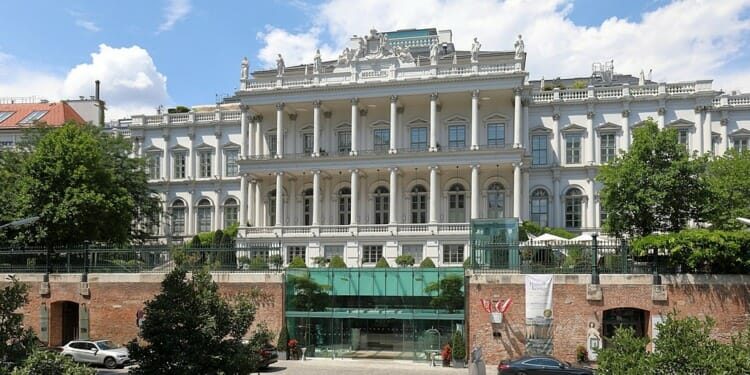Iran meets with officials from five major powers this week in Vienna, to discuss resuming the nuclear pact it made in 2015. The pact, known as the JCPOA (Joint Comprehensive Plan of Action), limited Iran’s nuclear programme in exchange for a lifting of sanctions from western countries including the US.
Talks that began in April 2021 fell apart in June, but have now resumed – but Iran is taking a hardline stance, only willing to agree to terms if all US and EU sanctions are lifted. Britain, China, France, Germany and Russia are also taking part in the negotiations.
Diplomats from Iran, the EU and Russia seem hopeful for good results.
“I feel extremely positive about what I have seen today,” Enrique Mora, the EU official chairing the talks, said on Monday.
Russia’s ambassador said that the size of Iran’s negotiating team, which is made up of almost 30 negotiators, suggests that Iran is serious about continuing talks, but that “talks can’t last forever. There is the obvious need to speed up the process.”
Iranian Deputy Foreign Minister and Iranian delegation leaving Palais Coburg just now. #JCPOA
Q: Mr. Bagheri, are you optimistic?
A: Yes! pic.twitter.com/XZ1iuLFgCE— Stephanie Liechtenstein (@StLiechtenstein) November 29, 2021
However, Iran, while optimistic, has accused the West of not being serious about a new agreement. Writing for the Financial Times, Iran’s deputy foreign minister and chief nuclear negotiator, Ali Bagheri Kani, said that Iran fears that the West as previously will use any agreement to “move the goalposts” and put more pressure on the country. He further stated that “experience tells us that the west does not seek to implement a deal.”
Iran has called for an end to all sanctions imposed on the country since 2017 in exchange for the agreement, which includes non-nuclear sanctions. The roughly 1,500 nuclear sanctions have always been part of a nuclear deal for Iran, but it now also calls for the lifting of sanctions for more than 500 individuals that the US believes are linked to human rights abuses or terrorism.
Bagheri also wants the US to give compensation for sanctions, and promise that they will not leave the agreement again. Biden, limited by term limits, has stated that there will be no more sanctions during his presidency if talks are successful. The issue here is that Biden cannot promise more than this, and the issue of compensation will also be very contentious as talks move forward.
Related articles: Severe Droughts, Record Heatwaves and Water Mismanagement Result in Deadly Riots in Iran | Protests in Iran and the Reasons Behind Them | Trump’s Sanctions Legacy — Ineffective, Illegal and Cruel
The 2015 nuclear deal was jettisoned by President Trump in 2018, and the country has suffered from sanctions and poor economic performance during the pandemic. At the same time, it has also increased its programme of uranium enrichment beyond the limits of the JCPOA agreement.
The government, led by the hardline anti-western cleric Ibrahim Raisi, likely sees a lifting of all sanctions as a way of not only immediately improving the country’s economic situation, but also as a show of toughness against the west.

Is Iran trying to build nuclear weapons?
Sanctions are always a difficult thing. They can be used to limit the power of oppressive governments, but at the same time they can cripple a country, causing all within it, guilty or not, to suffer. As a result, civilians experience both a regime’s brutality as well as economic hardship. And in this case, it’s worth noting that sanctions have not stopped Iran from advancing its nuclear programme.
There are concerns that Iran is hoping to do more than power the country with its uranium. The real worry for the other global powers involved in talks is that Iran might be building a bomb. It has been noted that Iran is only two to three weeks away from having enough fissile material to build one.
More importantly, they have not granted the International Atomic Energy Agency, the UN’s “atomic watchdog”, who were refused the ability to reinstall cameras at a site in Iran it believes is important to the success of the agreement. At present, only one other country in the Middle East has nuclear capabilities, that being Israel, Iran’s arch-enemy. The potential proliferation of nuclear weapons by Iran worries Israel, who fear that they could be made a target of attacks. The West as a whole worries that Iran risks a nuclear arms race in the region.
But on the other hand, the country is still years away from being able to actually make a bomb. And there is the possibility of repeating the WMD debacle that involved Iran’s neighbour, Iraq, and upturned middle eastern politics for over a decade – despite no actual evidence of weapons of mass destruction.
An agreement would be beneficial for all parties. Iran could see its economy improve dramatically, and western countries could possibly see an improvement in relations with the country. That said, it is vital that Iran keeps to its word and does not build nuclear weapons, and the US should realise that agreeing to Iran’s full terms would mean limiting its ability to hold Iran to account for its human rights violations.
The West, primarily the US and EU, should approach with concern and caution, but keep in mind that time is running out.
Editor’s Note: The opinions expressed here by Impakter.com columnists are their own, not those of Impakter.com. — In the Featured Photo: Palais Colburg, Vienna. Featured Photo Credit: Bwag.









